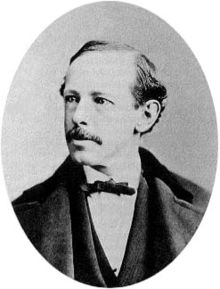 Horatio Alger is a well known American author from
the 19th century who is famous for his stories for young boys in
which the protagonists rise from poverty to success—from rags to riches. The
narrator mentions this man while he is in the chapel, saying the students often
witnessed “the black rite of Horatio Alger” (111).
Horatio Alger is a well known American author from
the 19th century who is famous for his stories for young boys in
which the protagonists rise from poverty to success—from rags to riches. The
narrator mentions this man while he is in the chapel, saying the students often
witnessed “the black rite of Horatio Alger” (111).
Barbee relays the story
of the founder with much emotion and reverence. The founder taught himself and escaped
his humble beginnings to a “place of learning” (119), where he “worked
noontimes, nights, and mornings for the privilege of studying” (119). This is
indicative of a Horatio Alger story because the founder came from a “great
struggle beginning” (119) and rose up, through hard work, to be a self-made man. Barbee encourages the students to follow in the footsteps of the founder
and work hard to become successful.
Barbee compares the founder’s
leadership to Moses’s when he says the founder led people “across the bottom of
the blood-red sea” (120) shouting, “LET MY PEOPLE GO!” (120). This alludes to Moses leading his people out of Egypt and the grasp of Pharaoh. Even the story of Moses can
be seen as having aspects of a Horatio Alger story. He was found floating
down the Nile by Pharaoh’s daughter and was adopted into Pharaoh’s house. He
became a great leader, freeing his people and bringing God’s laws to them.
It seems as though
Barbee wants the students to look at the founder as the triumphant protagonist
of a Horatio Alger story and a great leader like Moses. He also wants the
students to follow in the founder's footsteps. He wants them
to use their hard work to distance themselves from their beginnings.
To read more about Horatio Alger and his writings, click here.
Barbee uses Horatio Alger and Moses to bring hope to the students-no matter where they started, they can be successful as they age. Abby realizes that Barbee wants the students to follow in the Founder's footsteps and take on the leadership that he possesses. Do you think that this lesson sparked a revolution in the narrator's mind, making him think he can actually become something in his life?
ReplyDeleteThe references to Alger and Moses to the students brings motivation to the students. Knowing who these people are, these students should feel motivated to create their own movement and stand out to others. In response to what Joey questioned, the lecture may have added onto the previous experiences that contribute to the narrator's thinking of his life. By the time the narrator does think about becoming something greater than what he is considered to be, it will be result from a combination of all his experiences. This experience will definitely be a major factor in that revolution once it comes.
ReplyDeleteThe founder’s beginnings depict a Horatio Alger story. People like Trueblood, however, are not so lucky; Trueblood will never be able to rise to fame because his one mistake will always define him. Even the narrator does not achieve this sort of success. He used to believe he can graduate college and become someone who has a high position of power like Mr. Bledsoe. In the end, the narrator lives in a basement knowing he will never be anything more than just invisible.
ReplyDeleteI agree that the author includes these references to uplift the students. However, I do not think Bledsoe fits the characterization of a "Horatio Alger Hero." He does have the rags-to-riches transformation but lacks the honesty and virtue. Dr. Bledsoe looses these traits when he reveals his intentions to the narrator.
ReplyDeleteBarbee wants to make sure the studnets know that wherever you start from, it is possible to be whoever you want to be. This shows in Alger's stories through the rags to riches theme and in the story of Moses where he is born hated and grows up to be a great leader. Barbee wants the students to see that their school's foundation was founded on strength and triumph.
ReplyDeleteThe stage for the black rite was set upon the foundation of oppression. The institution reflected a new form of servile oppression. Upon being released from physical bondage of chattel slavery the new slaves would be those who learned and accepted the ways of their oppressors (benefactors) in order to lift themselves up show the innate goodness of their liberators and to worship their God, their works and all that surrounded them. Glorifying white supremacy and superiority reminding them that without the grace of whites there go I. I am no longer my brothers keeper but a keeper of the values of my oppressor and to him all I owe.
ReplyDelete